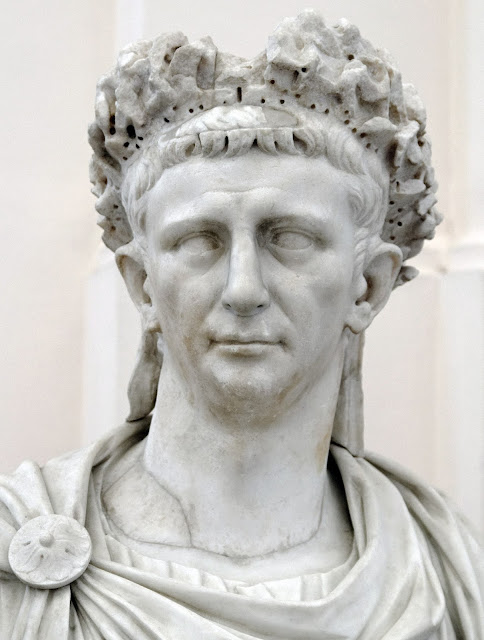 |
| Bust of Claudius Photo By Marie-Lan Nguyen (2011), CC BY 2.5 |
Welcome to the first entry of my series on disabled historical figures. Over the coming weeks, I hope to explore historical figures who also happened to be disabled. I will start with the Roman Emperor Claudius and move forward chronologically from there. Tiberius Claudius Caesar Augustus Germanicus was born on 1st August, 10 BCE in Lugdunum, Roman Gaul (modern-day Lyon, France). He was the Roman Emperor from 41 CE until his death in 54 CE.
What Disability did Claudius have?
There have been some conflicting ideas concerning the nature of Claudius’ condition. In the period surrounding the Second World War it was widely accepted that Claudius had poliomyelitis (‘infantile paralysis’); however, in more recent times a diagnosis of cerebral palsy seems more likely. The interpretation of the condition has changed depending on what disability is prevalent at the time of the historian. This means that there is still some speculation as to what Claudius’ condition may have been. For instance, Josiah Osgood believes that he suffered from a nervous disorder known as dystonia. The reason that he draws this conclusion is that some of Claudius’ symptoms include ‘irregular motor movements, a stammer and drooling’.
However, dystonia is not the only possibility. For example, Christian Laes states that some people now believe that Claudius could be diagnosed with spastic diplegia, also known as Little’s Disease. This condition could either be caused by brain damage at birth or be congenital. The symptoms of this condition include weak muscles, spastic twitches, slowness of speech and motor problems. Unlike other disabilities, it may not be immediately obvious and only becomes apparent later. The fact that the symptoms do not appear immediately may explain why Claudius survived for as long as he did. Spastic diplegia is a form of cerebral palsy which predominantly impacts the legs, but the arms may also feel its effects. Therefore, those who suspect cerebral palsy as the culprit would still be correct. This gives an idea of just how many possibilities there are when it comes to identifying the disability. Putting a label on what condition afflicted Claudius is not a priority. The important thing to note is that a disability was present.

Derek Jacobi as Claudius in the 1976 BBC series I, Claudius
Primary Source Evidence
Evidence that Claudius had a physical disability can be found in several sources. According to Cassius Dio, Claudius ‘was sickly in body, so that his head and hands shook slightly' and as a result he had a faltering voice. However, he notes that his mental abilities were unaffected, and Claudius even wrote on history. Dio also states that Claudius delivered his speeches sitting down, as though speaking while standing required too much effort.
Apocolocyntosis, a work written by Seneca the Younger to mock Claudius, gives several examples of his impairments. When he dies Claudius is brought in front of the gods. They are confused as to who he is as ‘he seemed to be threatening something, for he wagged his head ceaselessly’, and dragged his right foot. When they asked where he was from, he answered with a mumbled voice, in a language they did not understand. If the gods can’t understand you, then you know you’re in trouble!! Jupiter therefore summoned Hercules, who had journeyed across the world, and would know all the countries and languages in existence. However, he too failed in comprehending Claudius. In fact, he mistook Claudius for a monster and felt that ‘his thirteenth labour had come upon him’. This is not the only time in history when disabled people have been compared to monsters. That topic could occupy several blog posts by itself.
Several references are made, not only to Claudius’ impairments, but also his ill health. According to the Roman historian Suetonius (born 69 CE), Claudius’ mother, Antonia referred to him as “a monster of a man, not finished but merely begun by Dame Nature”. I doubt she would win any mother of the year awards! Her comments suggest that he was never a healthy individual. Seneca accentuates this point. At the beginning of Apocolocyntosis, the god Mercury questions the Fates as to why they kept Claudius alive for so long. He states that ‘four and sixty years it is now since he began to pant for breath’. Apparently, Claudius suffered his entire life and nobody felt that his life was worth living.
On that cheery note, I will conclude this post. Seeing as Claudius is a rather large topic, I have decided to divide him in two (not literally though, as I think he already has enough problems). In next week’s post, I will examine what impact Claudius’ disability had on his ability to rule.
The Wheelchair Historian
Further Reading
Dio, Cassius, Roman History, Books 56-60, Translated by Earnest Cary, Herbert B. Foster, (January 1924), http://penelope.uchicago.edu/Thayer/E/Roman/Texts/Cassius_Dio/60*.html Accessed: 6 August 2020.
Laes, Christian, 2018. Disabilities
and the Disabled in the Roman World: A Social and Cultural History (Cambridge:
Cambridge University Press).
Levick, Barbara, 2015. Claudius,
2nd edition (1st edition 1990) (London: Taylor and Francis). Accessed through
ProQuest Ebook Central, https://ebookcentral.proquest.com/lib/trinitycollege/detail.action?docID=2046490
Osgood, Josiah, 2007. ‘The Vox and Verba of an Emperor: Claudius, Seneca and Le Prince Ideal’, The Classical Journal, 102: 329-353 http://www.jstor.org/stable/30037929 Accessed: 6 August 2020.
Seneca the Younger, Apocolocyntosis, Translated by Michael Heseltine, W. H. D. Rouse. Revised by E. H. Warmington (January 1913).
Suetonius, Lives of the Caesars, Claudius, Translated by J.C. Rolfe (January 1914).
No comments:
Post a Comment